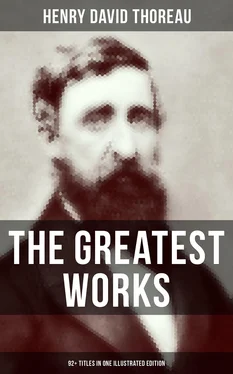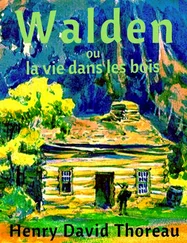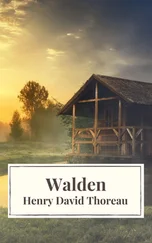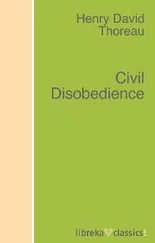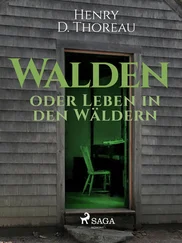Then spend an age in whetting thy desire,
Thou needs't not hasten if thou dost stand fast .
Some hours seem not to be occasion for any deed, but for resolves to draw breath in. We do not directly go about the execution of the purpose that thrills us, but shut our doors behind us and ramble with prepared mind, as if the half were already done. Our resolution is taking root or hold on the earth then, as seeds first send a shoot downward which is fed by their own albumen, ere they send one upward to the light.
There is a sort of homely truth and naturalness in some books which is very rare to find, and yet looks cheap enough. There may be nothing lofty in the sentiment, or fine in the expression, but it is careless country talk. Homeliness is almost as great a merit in a book as in a house, if the reader would abide there. It is next to beauty, and a very high art. Some have this merit only. The scholar is not apt to make his most familiar experience come gracefully to the aid of his expression. Very few men can speak of Nature, for instance, with any truth. They overstep her modesty, somehow or other, and confer no favor. They do not speak a good word for her. Most cry better than they speak, and you can get more nature out of them by pinching than by addressing them. The surliness with which the woodchopper speaks of his woods, handling them as indifferently as his axe, is better than the mealy-mouthed enthusiasm of the lover of nature. Better that the primrose by the river's brim be a yellow primrose, and nothing more, than that it be something less. Aubrey relates of Thomas Fuller that his was "a very working head, insomuch that, walking and meditating before dinner, he would eat up a penny loaf, not knowing that he did it. His natural memory was very great, to which he added the art of memory. He would repeat to you forwards and backwards all the signs from Ludgate to Charing Cross." He says of Mr. John Hales, that, "He loved Canarie," and was buried "under an altar monument of black marble————with a too long epitaph"; of Edmund Halley, that he "at sixteen could make a dial, and then, he said, he thought himself a brave fellow"; of William Holder, who wrote a book upon his curing one Popham who was deaf and dumb, "he was beholding to no author; did only consult with nature." For the most part, an author consults only with all who have written before him upon a subject, and his book is but the advice of so many. But a good book will never have been forestalled, but the topic itself will in one sense be new, and its author, by consulting with nature, will consult not only with those who have gone before, but with those who may come after. There is always room and occasion enough for a true book on any subject; as there is room for more light the brightest day and more rays will not interfere with the first.
We thus worked our way up this river, gradually adjusting our thoughts to novelties, beholding from its placid bosom a new nature and new works of men, and, as it were with increasing confidence, finding nature still habitable, genial, and propitious to us; not following any beaten path, but the windings of the river, as ever the nearest way for us. Fortunately we had no business in this country. The Concord had rarely been a river, or rivus , but barely fluvius , or between fluvius and lacus . This Merrimack was neither rivus nor fluvius nor lacus , but rather amnis here, a gently swelling and stately rolling flood approaching the sea. We could even sympathize with its buoyant tide, going to seek its fortune in the ocean, and, anticipating the time when "being received within the plain of its freer water," it should "beat the shores for banks,"—
"campoque recepta Liberioris aquae, pro ripis litora pulsant."
At length we doubled a low shrubby islet, called Rabbit Island, subjected alternately to the sun and to the waves, as desolate as if it lay some leagues within the icy sea, and found ourselves in a narrower part of the river, near the sheds and yards for picking the stone known as the Chelmsford granite, which is quarried in Westford and the neighboring towns. We passed Wicasuck Island, which contains seventy acres or more, on our right, between Chelmsford and Tyngsborough. This was a favorite residence of the Indians. According to the History of Dunstable, "About 1663, the eldest son of Passaconaway (Chief of the Penacooks) was thrown into jail for a debt of Ł45, due to John Tinker, by one of his tribe, and which he had promised verbally should be paid. To relieve him from his imprisonment, his brother Wannalancet and others, who owned Wicasuck Island, sold it and paid the debt." It was, however, restored to the Indians by the General Court in 1665. After the departure of the Indians in 1683, it was granted to Jonathan Tyng in payment for his services to the colony, in maintaining a garrison at his house. Tyng's house stood not far from Wicasuck Falls. Gookin, who, in his Epistle Dedicatory to Robert Boyle, apologizes for presenting his "matter clothed in a wilderness dress," says that on the breaking out of Philip's war in 1675, there were taken up by the Christian Indians and the English in Marlborough, and sent to Cambridge, seven "Indians belonging to Narragansett, Long Island, and Pequod, who had all been at work about seven weeks with one Mr. Jonathan Tyng, of Dunstable, upon Merrimack River; and, hearing of the war, they reckoned with their master, and getting their wages, conveyed themselves away without his privity, and, being afraid, marched secretly through the woods, designing to go to their own country." However, they were released soon after. Such were the hired men in those days. Tyng was the first permanent settler of Dunstable, which then embraced what is now Tyngsborough and many other towns. In the winter of 1675, in Philip's war, every other settler left the town, but "he," says the historian of Dunstable, "fortified his house; and, although `obliged to send to Boston for his food,' sat himself down in the midst of his savage enemies, alone, in the wilderness, to defend his home. Deeming his position an important one for the defence of the frontiers, in February, 1676, he petitioned the Colony for aid, "humbly showing, as his petition runs, that, as he lived "in the uppermost house on Merrimac river, lying open to ye enemy, yet being so seated that it is, as it were, a watch-house to the neighboring towns, "he could render important service to his country if only he had some assistance," there being, "he said," never an inhabitant left in the town but myself." Wherefore he requests that their "Honors would be pleased to order him three or four men to help garrison his said house," which they did. But methinks that such a garrison would be weakened by the addition of a man.
"Make bandog thy scout watch to bark at a thief,
Make courage for life, to be capitain chief;
Make trap-door thy bulwark, make bell to begin,
Make gunstone and arrow show who is within."
Thus he earned the title of first permanent settler. In 1694 a law was passed "that every settler who deserted a town for fear of the Indians should forfeit all his rights therein." But now, at any rate, as I have frequently observed, a man may desert the fertile frontier territories of truth and justice, which are the State's best lands, for fear of far more insignificant foes, without forfeiting any of his civil rights therein. Nay, townships are granted to deserters, and the General Court, as I am sometimes inclined to regard it, is but a deserters' camp itself.
As we rowed along near the shore of Wicasuck Island, which was then covered with wood, in order to avoid the current, two men, who looked as if they had just run out of Lowell, where they had been waylaid by the Sabbath, meaning to go to Nashua, and who now found themselves in the strange, natural, uncultivated, and unsettled part of the globe which intervenes, full of walls and barriers, a rough and uncivil place to them, seeing our boat moving so smoothly up the stream, called out from the high bank above our heads to know if we would take them as passengers, as if this were the street they had missed; that they might sit and chat and drive away the time, and so at last find themselves in Nashua. This smooth way they much preferred. But our boat was crowded with necessary furniture, and sunk low in the water, and moreover required to be worked, for even it did not progress against the stream without effort; so we were obliged to deny them passage. As we glided away with even sweeps, while the fates scattered oil in our course, the sun now sinking behind the alders on the distant shore, we could still see them far off over the water, running along the shore and climbing over the rocks and fallen trees like insects,—for they did not know any better than we that they were on an island,—the unsympathizing river ever flowing in an opposite direction; until, having reached the entrance of the island brook, which they had probably crossed upon the locks below, they found a more effectual barrier to their progress. They seemed to be learning much in a little time. They ran about like ants on a burning brand, and once more they tried the river here, and once more there, to see if water still indeed was not to be walked on, as if a new thought inspired them, and by some peculiar disposition of the limbs they could accomplish it. At length sober common sense seemed to have resumed its sway, and they concluded that what they had so long heard must be true, and resolved to ford the shallower stream. When nearly a mile distant we could see them stripping off their clothes and preparing for this experiment; yet it seemed likely that a new dilemma would arise, they were so thoughtlessly throwing away their clothes on the wrong side of the stream, as in the case of the countryman with his corn, his fox, and his goose, which had to be transported one at a time. Whether they got safely through, or went round by the locks, we never learned. We could not help being struck by the seeming, though innocent indifference of Nature to these men's necessities, while elsewhere she was equally serving others. Like a true benefactress, the secret of her service is unchangeableness. Thus is the busiest merchant, though within sight of his Lowell, put to pilgrim's shifts, and soon comes to staff and scrip and scallop shell.
Читать дальше
